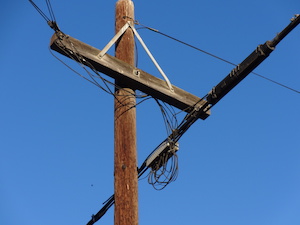
Frontier will have a lot of Verizon mess to clean up.
Frontier Communications will be able to buy Verizon’s wireline systems in California, if it almost doubles the number of homes and businesses that will get new or upgraded broadband service, and if the California Public Utilities Commission votes yes on the proposed decision approving the deal drafted by administrative law judge Karl Bemesderfer and released on Friday.
Relying on a stack of agreements between Frontier and various advocacy groups and the CPUC’s office of ratepayer advocates, an opinion by the state attorney general that the deal “will not adversely impact competition”, and evidence gathered during the several months the sale has been under review, Bemesderfer’s proposed decision would find that it meets the requirements of California public utilities law. The text references the agreements – links to the full texts are below – but the bottom line for broadband deployment is that Frontier will…
Provide 25 Mbps downstream and 2-3 Mbps upstream to an additional 400,000 households in California by December 31, 2022…
Provide 10 Mbps downstream and 1 Mbps upstream to an additional 100,000 unserved households beyond its CAF II commitments by December 31, 2020…
Deploy 10 Mbps downstream and 1 Mbps upstream to 77,402 households in accordance with the CAF II requirements in the census blocks identified by the FCC…
Deploy 6 Mbps downstream and 1 to 1.5 Mbps upstream to an additional 250,000 households in California…
With these additional commitments, more than 827,000 households in California will benefit from enhanced broadband services if the Transaction is completed.
Put another way, Frontier is promising to upgrade broadband service for 38% of the approximately 2.2 million Californian customers it’ll have once it adds Verizon’s territory to what it already has in the state. It won’t necessarily meet the CPUC’s minimum standard of 6 Mbps down/1.5 Mbps up, let alone the FCC’s 25 down/3 up benchmark, but it will better than what Verizon offers now, which in many places is nothing at all.
Other conditions include the interim lifeline broadband program that’ll provide $14 per month service to qualifying households, at least until the Federal Communications Commission comes up with a national plan, and a requirement that Verizon pony up enough money to “correct all known [aerial maintenance and safety standard] deficiencies” in its network.
As part of its upgrade work – which includes plain old telephone service as well as broadband – Frontier will have to work with “local broadband providers on means of partnering with them” and, in particular, will use the Digital 395 middle mile network “to provide additional transport capacity to a list of communities in the Eastern Sierra 395 corridor area of California”.
Anyone can file comments on the proposed decision, which is scheduled to be considered by the commission at its 3 December 2015 meeting.
Proposed decision approving, with conditions, Frontier’s purchase of Verizon’s systems in California
Agreements between Frontier and advocacy groups
Motion to accept the agreements
Motion to waive rules in order to accept agreements
